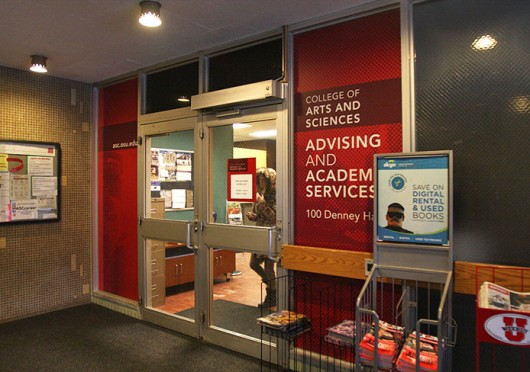
The College of Arts and Sciences restructured its advising system for Fall Semester so students would have one adviser instead of multiple.
Credit: Shelby Lum / Photo editor
Some Ohio State students are worried a switch to a single-adviser system will affect the quality of the answers they receive, though the semester-old change has largely been a success otherwise.
The College of Arts and Sciences has received feedback through advisers, faculty members, department reports and student advisory groups since the change at the start of Fall Semester, said David Manderscheid, OSU executive dean and vice provost of the College of Arts and Sciences.
“The change so far is a fabulous success,” Manderscheid said. “We have not heard anything negative about it.”
He said student suggestions prompted the change.
“We decided to make the switch because there were concerns expressed by some students that they had to go to one adviser for their major and another adviser for general education requirements, and it wasn’t always clear which one they should go to,” Manderscheid said. “Sometimes they would hear one thing one place and another thing another place so we were just trying to make sure the students had one person and one point of contact so they knew who they had to go to.”
General education curriculum advisers were trained in major advising and placed in departments the college had estimated would need extra help. No faculty members lost their jobs as a result of the advising change, but some did decide to retire, Manderscheid said.
Ruth Friedman, OSU undergraduate studies academic program manager in the Department of English, said the changes allow for more individual attention to be paid to students.
“As advisers, we have to make sure we do the best we can to connect with students because we are that main point of contact, there are not two people now,” Friedman said. “To me, it gives us great flexibility but it also means we really need to pay attention to each student — who they are, what they need, where they are, because they’re not necessarily going to see a GEC adviser.”
Some advisers initially had concerns about relocating from Denney Hall to offices in their designated major’s departments, fearing they would lose communication with their peers without a centralized location, Manderscheid said.
He said, though, meetings have helped with communication between interdepartmental faculty.
Pablo Tanguay, academic adviser in the Department of English, said there are several benefits he’s noticed from the change.
“Students can get in to see their adviser quicker, their adviser knows them much better because they are seeing them for all of their advising needs, they come in more often and it’s a much more welcoming sort of atmosphere because they are in their department, their academic unit where their major is,” Tanguay said. “So they can talk to staff, faculty and people who are in their subject area.”
Kevin Livingston, a third-year in economics and political science, said he hasn’t visited an adviser since the change but has concerns about the switch.
“Although my opinion may change after visiting an adviser, my biggest problem now is that you’re sort of losing the specialization of it,” Livingston said. “So now you’re asking major advisers to not only advise people on their majors, but to also make sure their GECs are all up to code, and they may not have the expertise that the Arts and Sciences advisers used to have.”
Kristina Sossa, a third-year in strategic communication, said she went to her adviser twice before Spring Semester started this year.
“I love that I only have one adviser to go to and she knows everything,” Sossa said.


